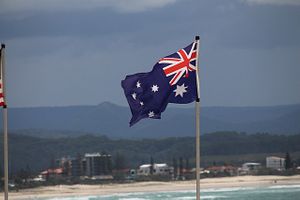There has been much debate surrounding the impact of a Trump presidency on the United States’ established alliance framework. Trump’s pre-election intransigence and penchant for acting erratically and irrationally – promising to revoke NATO, dismantling former President Barack Obama’s “Pivot to Asia,” and championing under “America First” for a reorganization of the liberal internationalist world order that America had piloted since the end of World War II – cast doubts upon the U.S. role as global hegemon. Yet – at least until January 20 – this was all election talk, and the international policy responses flirted with were vague and ultimately disillusioned.
Australia’s conversation around her Asia-Pacific policy options under a Trump presidency typifies this. As Professor Hugh White has argued, Australia needs an honest, transparent, and in-depth discussion specifying what a viable national security strategy looks like without the United States as a guarantor. Trump’s behavior post-election — executive order rampages, labeling his call with Australia’s prime minister the “worst ever,” and his blatant disregard for normalcy and historical tradition — renders this discussion imperative.
What then, should be Australia’s focus? Australia’s security objectives (ensuring a secure, resilient Australia; fostering security and stability in the wider Indo-Pacific region; promoting stability and cooperation in Southeast Asia; and supporting global security) have not changed dramatically. However, the framework of the current U.S.-led order in the Asia-Pacific, which Australia relies on for its own domestic security and trading routes, has. The abatement of the United States in the region and her subsequent decline in strategic dominance requires a parallel shift in Australian foreign policy to offset this.
The benefits of the U.S. alliance are indisputable – intelligence, weaponry, equipment, and technology that would prove challenging to source elsewhere. More importantly, the United States also acts as a credible deterrent to Australia’s would-be aggressors, and serves as a stabilizing influence in the Asia-Pacific, with its various military bases that keep security costs low for regional players like Australia. Australia’s focus should be creating and promoting regional infrastructure that can replace these functions, at least partially.
Australia’s goal should be to foster the development of a unified Asia-Pacific community, with itself firmly ingrained in the regional economic, security, military, and political architecture. Australia should play a more active role in policy-setting in the region, focusing on greater security, economic, political, and military cooperation with China and other friends in the region – namely Japan and South Korea, but also Malaysia, the Philippines, and Indonesia. The Australian government must focus on bilateral and multilateral partnerships that seek to prioritize the security of each nation and encourage transparency in the face of heightened geopolitical risk.
It must also seek to use these partnerships to invest in regional institutions to help build a policy consensus, and to create a robust regional framework that encourages clarity in responses to geopolitical events and proposes robust controls around crisis management. Ensuring Australia’s diplomatic capabilities are reinforced to prepare for more active diplomacy will facilitate this, and so Canberra should consider reversing cuts to aid expenditure and foreign office (DFAT) funding. Australia should also strengthen her support for UN agencies, work more efficiently both bilaterally and through the UN, and use existing organizations and forums such as the G20, APEC, and the East Asia Summit to project her voice to become a more credible regional player. Australia must also look across other key verticals, such as financial cooperation, transport connectivity, energy connectivity, and regional cooperation on climate change, to look for ways to establish credibility and value with other regional powers, foster a unified Asia-Pacific community, and to prove herself essential to a unified Asia-Pacific architecture – with or without the United States.
Australia should also consider seeking ASEAN observer status, which neighboring Papua New Guinea and Timor-Leste have had since 1976 and 2002 respectively, with the aim of joining ASEAN in the long run and solidifying her position in Asia. As part of this Asia-centric strategy, Australia should also look to significantly strengthen her ties with lesser heralded regional players such as Indonesia, Malaysia, and the Philippines – particularly Indonesia. The geographical proximity of all three countries will be beneficial in an increasingly insecure geopolitical age, and partnerships with all three are strategically important.
Indonesia is also the largest Muslim country in the world, and thus the stability, unity, and economic growth of Indonesia is salient to Australia’s long term growth prospects and fight against Islamic extremism. The threat of Islamic extremism – even if Islamic State is defeated – will not abate in the coming years. It’s crucial that Australia nurture its diplomatic ties with Indonesia and the government’s relationship with Indonesian President Joko Widodo to ensure Indonesia becomes a vital source of intelligence on Islamic extremism and ways to mitigate it most effectively. Enacting the same approach with Malaysia and the Philippines will be beneficial too, and will improve Australia’s intelligence and intellectual capital in the fight against extremism, making the country more credible as a result.
Australia needs a policy framework that explores where its economic, security, military, and political ties will come from if the United States truly retreats from the Asia-Pacific region and a Trump presidency heralds a significant restructuring in the Australia-U.S. alliance. Australia must become more tenacious, more autonomous, and prove her credibility to deepen and diversify her security, economic, and political relations with other countries in the region. If it doesn’t, and Trump’s axe falls, Australia will find itself adrift, bereft of both the howdah of the U.S. foreign policy elephant and a seat on the back of the Chinese dragon.
Nick Derewlany is a Political Economy and International Relations graduate from the University of Sydney, currently working for geopolitical risk consultancy Wikistrat.

































